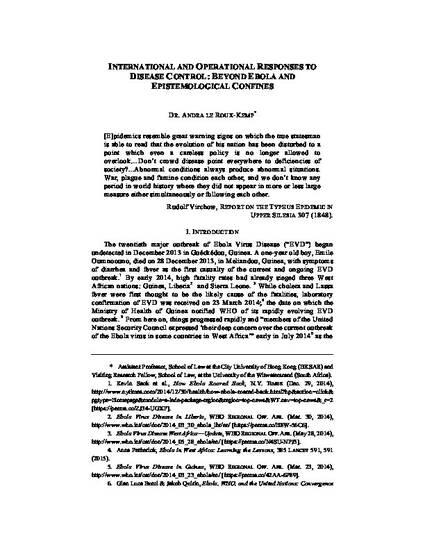
Article
International and Operational Responses to Disease Control: Beyond Ebola and Epistemological Confines
Indiana Health Law Review
(2018)
Abstract
Much has already been written on this most recent EVD outbreak—evaluating and dissecting the contributions and failings of the various role-players involved, and considering what can be done differently in future. This article will contribute to this important and ongoing debate and will specifically focus on the international, operational, and national legal frameworks in terms of which large-scale health crises like that of Ebola play out. It will be argued that the very culture and architecture of this transnational legal and operational framework for public health emergencies is isolated from the national realities in which it operates and merely offers a hierarchical authority of what legally ought to be done, with little regard to what is actually necessary and possible on the ground. In considering the most recent Ebola outbreak, and juxtaposing it with the Severe Acute Respiratory Syndrome (“SARS”) outbreak of 2003, it will be shown that a more nuanced transnational legal understanding of public health emergencies is indeed needed—a holistic approach that goes beyond biomedical/scientific and legalistic confines in dealing with disease outbreak and control. It is again important to emphasise here, for the sake of clarity, that this article is exclusively focused on the transnational legal and operational framework in which public health emergencies play out. International humanitarian responses, general public health considerations, as well as other national systemic considerations—like those relating to health systems—although important, will not be considered here. A brief interlude on the methodology of this article also deserves a place here. As already indicated above, much literature exists on the Ebola outbreak, and with the attention now shifting to the Zika virus, it is important to further distinguish the contribution of this article. This article utilises a primarily transdisciplinary lens in narrating the rise and fall of two notable epidemics of the modern world. A variety of sources, from different disciplines and bases, are used in presenting an easily accessible text that recounts key themes of both epidemics—highlighting similarities and differences, and raising important questions for the future. As with most narrative research methodologies, reliance is also placed on newspaper articles in constructing an account of how the two epidemics played out, each in its own particular time and space. The disease narrative ultimately presented in this article, therefore simultaneously serve as a chronicle of the two epidemics, while also reflecting why a more nuanced transnational legal understanding of public health emergencies is indeed needed. To facilitate this discussion and analysis, the content of this article is divided into four parts. First, in Part II, the lifecycle of two epidemics will be considered, Ebola, and the 2003 SARS outbreak. Considering these two outbreaks and the international legal responses thereto provides a valuable lens through which the multiple layers of disease outbreaks and control from the past to the present can be observed. In Part III, this paper provides an overview of the international legal and operational framework for public health emergencies, confined to references and examples from the two outbreaks selected for and discussed in Part II. Part IV considers the national legal responses of those countries most affected by the recent Ebola outbreak and the 2003 SARS outbreak. Part V discusses the question of whether to quarantine or not. Part VI discusses lessons to be learned, and why knowledge production beyond disciplinary confines is necessary. And finally, Part VII of this article concludes with a critical analysis of two observed failings of the current international legal and operational framework for public health emergencies. In considering the shortcomings of the current framework it will be argued that a more holistic approach to disease control is required that looks beyond disciplinary confines.
Keywords
- Health Law,
- Public Health,
- International Health Regulations,
- Epidemics
Disciplines
Publication Date
Summer May 8, 2018
Citation Information
Andra le Roux-Kemp. "International and Operational Responses to Disease Control: Beyond Ebola and Epistemological Confines" Indiana Health Law Review Vol. 15 Iss. 2 (2018) p. 247 - 293 Available at: http://works.bepress.com/andra-leroux-kemp/24/
